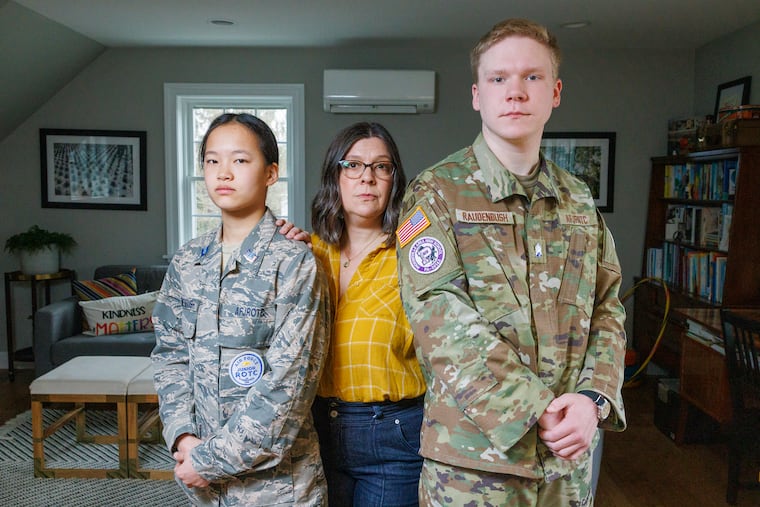The Air Force plans to shut down Phoenixville Area High School’s JROTC program. The school says it doesn’t make sense.
In November, the program earned the most “exceeds standards” ratings it’s ever received. But shortly after, the group got word the program was going to be deactivated at the end of the school year.

The day the Air Force sent an inspector to Phoenixville Area High School, Drew Raudenbush was there at 6 a.m., ready to demonstrate that the school’s Junior Reserve Officers’ Training Corps was meeting military standards — everything from its finances and curriculum, to its drill performance and organization of its uniforms.
“It’s a stressful day,” said Raudenbush, 18, a senior and the unit’s squadron commander. “Any rock that can be turned, he’s going to turn.”
The November inspection went well; the program earned the most “exceeds standards” ratings it’s ever received, Raudenbush said. But shortly after that, he got surprising news: The program was going to be deactivated at the end of the school year.
The reason, the Air Force told Phoenixville school officials, was enrollment: 65 students participate in the school’s JROTC program, which involves both classes and extracurricular activities. The program, which includes lessons on the science and history of aviation, gives students a leg up if they choose to join any branch of the military after graduation and is paid for in part by the Air Force.
Under federal law, however, JROTC programs require the participation of 10% of the school’s population or 100 students, whichever is less.
In Phoenixville — where the high school enrolls more than 1,200 students — school leaders say that bar is unreasonably high.
With 65 students, JROTC is “one of the top extracurricular activities at the high school,” said Scott Overland, the Phoenixville school board’s vice president, with students doing volunteer work and presenting the colors at community events, including Villanova basketball games. He said that when the program was launched in 2015, it had 44 students, and has experienced “pretty steady growth” since then.
Local politicians get involved to save the program
The school board earlier this month sent a letter to U.S. Sens. Bob Casey and John Fetterman and U.S. Rep. Chrissy Houlahan, asking them to review the laws governing JROTC programs.
“At a time when I think it’s more important than ever for us to be instilling these values and skills, it’s pretty surprising to me that we would be losing support from the Air Force for this program,” Overland said, noting military recruiting challenges.
The Air Force didn’t respond to requests for comment.
The district has the backing of Houlahan, an Air Force veteran who represents Chester County. A ROTC graduate, Houlahan and several other members of Congress sent a letter to the Air Force in January, asking that it reconsider the closure of Phoenixville’s unit, along with four other programs across the country.
Of all the Air Force’s 841 JROTC units, 193 are “non-viable due to cadet enrollment below minimum requirements,” according to the letter. Of those 193, the letter said, five units have been approved for closure; it was unclear why Phoenixville was one of those five. The rest were put on probation, the letter said.
Instead of closing units, the Air Force should be trying to engage high school students to help recruiting efforts, the members of Congress said in their letter, noting that last year the legislative body authorized an increase in JROTC programs.
High school JROTC programs such as Phoenixville’s “are more than a glimpse into military life — they are force multipliers in our community that remind us the importance of serving others,” Houlahan said in a statement to The Inquirer. “Congress has made it clear: We need more of these programs, not fewer.”
Houlahan said she was working to keep Phoenixville’s program open — noting that she previously helped the Coatesville Area School District maintain its JROTC program when its enrollment was cited by the Air Force as being too low.
In that case, the district partnered with the Oxford Area and Downingtown Area school districts to bring more students into its program.
Phoenixville already has an arrangement with Great Valley, Overland said, but the number of students participating from that district is relatively small. This year, three students in Phoenixville’s program are from Great Valley; last year, there were eight.
The Air Force provided Phoenixville with $64,000 last year, covering 50% of instructor salaries and dry cleaning of uniforms, Overland said. (The program had two instructors until the middle of last year, when one left; now it’s taught by one retired Air Force officer.)
Witnessing the unity of the community
While students who complete JROTC programs can join the military at a higher rank and pay than peers, the program doesn’t bill itself as a recruiting tool. Raudenbush, who plans to join the Air Force after graduation on a four-year contract, said few Phoenixville cadets do the same.
But he and his mother, Kelly, said the program’s benefits go far beyond preparation for military careers. In Phoenixville, they said, it’s brought together a diverse group of students who might not otherwise interact.
“When you see them ... singing together, marching together, wearing coordinated uniforms — there’s something really satisfying to witness the unity in the community JROTC has provided,” Kelly Raudenbush said. Her daughter, a freshman, also joined the program, following her older brother’s lead.
Working with students with different backgrounds and interests is valuable preparation for life after high school, Drew Raudenbush said. While there have been discussions about creating an extracurricular group to replace JROTC next year, without elements like the class, the uniforms, and the group’s instructor, Raudenbush doesn’t think it would have the same impact.
“To know this won’t be here next year really hurts,” he said.